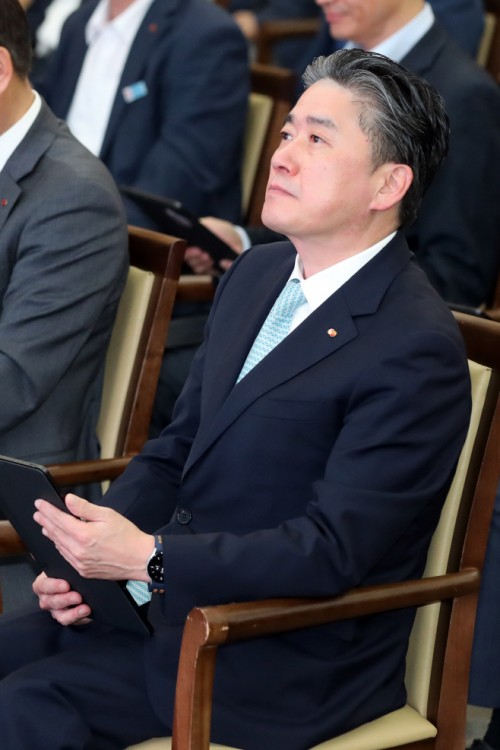 |
| Cheong Seung-il, chief of South Korea’s state-run utility Korea Electric Power Corp. (KEPCO), attends a meeting at the company’s headquarters in Naju, South Jeolla Province, on May 12, 2023. He offered to resign the same day, taking responsibility for the company’s snowballing losses./ Source: Yonhap |
AsiaToday reporter Lee Wook-jae
Cheong Seung-il, chief of South Korea’s state-run utility Korea Electric Power Corp. (KEPCO), who was appointed at the end of the Moon Jae-in administration, resigned abruptly to take responsibility for the company’s cumulative deficit of 44 trillion on. His resignation is drawing attention to whether the issue of Moon Jae-in administration’s high-handed personnel appointment for public institutions will be addressed.
The normalization of public institutions, which has been criticized for being a place for reemployment for people who had worked for previous President Moon or his party, the Democratic Party (DP), has emerged as a top priority for the Yoon Suk-yeol administration which has been launched in the midst of the global economic crisis.
According to Alio, the open public institution management information system, out of 367 public organizations, 288, or 78.5 percent of the total, were public institution chiefs appointed under the Moon administration as of March, while 58, or 15.8 percent were appointed under the incumbent administration.
In particular, the Moon administration appointed 59 heads of public institutions six months before leaving office. Considering that the term of a head of a public agency is two to three years, some personnel will remain in office until March 2025.
The problem is that the cohabitation of heads of institutions from the former and the incumbent government may not create just a simple personnel conflict. Repeated policy confusion could lead to delays in the new government’s golden time and policy failures to realize the policy.
Public enterprises and public institutions require expertise regardless of the color of the administration, but most of them are entrusted with government affairs through close coordination with the national policy. If the head of the agency thinks differently from the direction of state affairs, confusion is inevitable. Despite these circumstances, the reason why a large number of heads of institutions from the former government are trying to hold out was said have been affected by the ‘blacklist of the Ministry of Environment’ ruling that dismissal was guilty during the term.
#personnel appointment #KEPCO #Moon Jae-in administration
Copyright by Asiatoday
Most Read
-
1
-
2
-
3
-
4
-
5
-
6
-
7





















